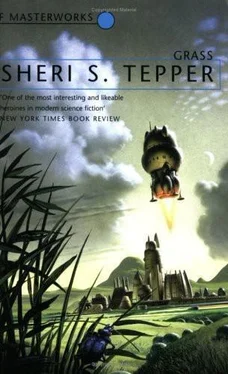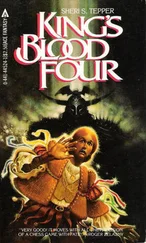Sheri Tepper - Grass
Здесь есть возможность читать онлайн «Sheri Tepper - Grass» весь текст электронной книги совершенно бесплатно (целиком полную версию без сокращений). В некоторых случаях можно слушать аудио, скачать через торрент в формате fb2 и присутствует краткое содержание. Город: London, Год выпуска: 2002, ISBN: 2002, Издательство: Gollancz, Жанр: Фантастика и фэнтези, на английском языке. Описание произведения, (предисловие) а так же отзывы посетителей доступны на портале библиотеки ЛибКат.
- Название:Grass
- Автор:
- Издательство:Gollancz
- Жанр:
- Год:2002
- Город:London
- ISBN:9781857987980
- Рейтинг книги:4 / 5. Голосов: 1
-
Избранное:Добавить в избранное
- Отзывы:
-
Ваша оценка:
- 80
- 1
- 2
- 3
- 4
- 5
Grass: краткое содержание, описание и аннотация
Предлагаем к чтению аннотацию, описание, краткое содержание или предисловие (зависит от того, что написал сам автор книги «Grass»). Если вы не нашли необходимую информацию о книге — напишите в комментариях, мы постараемся отыскать её.
Grass — читать онлайн бесплатно полную книгу (весь текст) целиком
Ниже представлен текст книги, разбитый по страницам. Система сохранения места последней прочитанной страницы, позволяет с удобством читать онлайн бесплатно книгу «Grass», без необходимости каждый раз заново искать на чём Вы остановились. Поставьте закладку, и сможете в любой момент перейти на страницу, на которой закончили чтение.
Интервал:
Закладка:
“There is a lot I don’t understand,” Tony said, conveying what they all felt. There had been an interchange, but most of it had been more enigmatic and tantalizing than informative.
“There is much I have never understood,” Brother Mainoa said. He looked very weary tonight, very old.
“These foxen are the children of the Hippae?” Father James asked. “They talked much of that.”
“Not children,” Brother Mainoa said. “No. No more than the butterfly is the child of the caterpillar.”
“Another metamorphosis,” Marjorie told them. “Hippae metamorphose into foxen.”
“Some do,” he assented. “Not all do.”
“All once did,” she insisted, sure of it. It was clear to her, though the means by which the knowledge had come was hard to define. She simply knew. “All the Hippae used to become foxen, long ago.”
“All once did,” he agreed. “And at that time, it was the foxen who laid the eggs.”
Marjorie rubbed her head, trying to remember things she had learned long ago in school. “It must have been a mutation,” she said. “Some of the Hippae must have mutated and began to reproduce precociously, while they were still in the Hippae stage. There are animals that do that even on Terra. Reproduce in their larval stage, I mean. But in order for that mutation to have survived, there must have been some reproductive advantage…”
“It is in the Hippae stage that they use caverns. Perhaps the Hippae guarded their own eggs more assiduously,” Father James offered. “Perhaps more of the Hippae eggs survived than did those of the foxen.”
“And in time, Hippae did most of the reproduction. And not all of them metamorphosed into these creatures, these foxen, anymore. How many foxen are there?”
“Planet-wide?” Brother Mainoa shook his head “Who knows? Every time the great cry is heard, these elder foxen know that a new one has been changed. They go out, tens and dozens of them, and try to find the new one — find it, welcome it, bring it into the forest where it will be safe. But if the Hippae find it first, they kill it while it is still weak and uncertain, or if it takes refuge in a copse, they get men on their backs and hunt it down.”
“Don’t the Hippae know that they themselves…” Father James shook his head.
Brother Mainoa laughed bitterly. “They don’t believe it. They don’t believe that they change into foxen. They refuse to believe it. They think they remain always as they are until they die. Many of them do die. Don’t you remember when you were a boy, Father? Did you ever think, then, that you would grow older?”
Sylvan moved restlessly along the braided railing, looking out into the night of the forest. “They must hate us,” he said. “All the time they were talking to you, I kept thinking how they must hate us bons.”
“Because you hunt them?” Tony asked.
“Yes. Because we bons hunt them. Because we help the Hippae hunt them.”
“I don’t think they blame you,” Brother Mainoa said. “They blame themselves.” He thought about this for a moment, then amended it. “At least, that’s how the one I’ve been talking to feels. The others may feel differently.”
“What do you call him?” Marjorie asked. “I can’t come up with a label for him. Them.”
“First,” Brother Mainoa replied. “I call him First. Or Him, capitalized, as though He were God.” He laughed weakly.
“It was they you were talking about when we had lunch together at Opal Hill,” Father James said. “The foxen! It is they who were concerned with original sin.”
Brother Mainoa sighed. “Yes. Though the reason I gave for their concern was not the real one. They have no pangs of conscience over eating the peepers. They have always done so. There are far more peepers than the world could hold if they all matured, and the foxen know that. They eat them as big fish eat little fish, with no concern for the relationship. No, what weighed upon them was the genocide of the Arbai. Some of them have acquired ideas of sin and guilt from our minds, and they do not know what to do with these concepts. It distresses them. Those that think about it. Not all of them do. Like us, they are variable. Like us, they argue, sometimes bitterly.”
Father James turned toward him, curious. “They feel guilty because of the slaughter in the Arbai city?”
“No. Not merely that slaughter. I mean the genocide of the Arbai,” Mainoa repeated. “All the Arbai. Everywhere. I don’t know how it was done, but the Hippae killed them all.”
“Everywhere?” Marjorie was incredulous. “On other worlds? Everywhere?”
“As the plague is killing us everywhere now,” said Father James in sudden comprehension. “I think that’s why Brother Mainoa brought us here.”
“That’s why,” Brother Mainoa sighed again. “Because the foxen, at least some of the foxen, did not want it to happen again. They thought they had prevented its happening again. Don’t ask me how, I don’t know. Somehow, they were not careful enough, not attentive enough, and though there are things they have not or will not tell me, they have said it may already be too late.”
“No,” Marjorie said. “No. It cannot be too late. I will not accept that.”
Brother Mainoa shrugged, his tired face crumpling. Father James reached out a hand.
“No,” she said again with absolute certainty, thinking of Stella, out there somewhere, of Tony, of all those she had known and cared about all her life. Very small being or not, nameless or not. she would not tolerate this. “Whatever else we may believe, we may not believe it is too late.”
15
At the Friary, while an aircar was readied and certain accoutrements were assembled (assassins, for the use of, Elder Brother Fuasoi thought to himself, grimacing at his own private joke) Fuasoi stewed and steamed in his lonely office, thinking of a thousand ways the plans of the Moldies might already have been forestalled. Or, if not already, then imminently. Perhaps Sanctity had found out about him and had sent people. Perhaps the Health Authority on Semling had become aware of Moldy plots. Perhaps Mainoa had talked to others; perhaps the ambassador knew. He opened his desk drawer for the tenth time, searching for the book that wasn’t there, Mainoa’s book. Who had taken it? Had Jhamlees taken it? That totally Sanctified idiot? Had he? If he had, Jhamlees would be messaging Sanctity about it. Messaging, getting messages back. Like a message from the Hierarch saying, open the secret armory and take the planet for Sanctity. A message like that.
Not that he knew there was a secret armory here in the Friary. Everyone said so; but then, everyone could be wrong. Suppose the Green Brothers did take the planet, wipe out the bons and the mounts and the hounds; so then what would they do with it?
They’d find a cure, that’s what they’d do with it. Mainoa had seemed to think there was a cure here. They’d find it. Give them a little time…
Fuasoi had assumed there was plenty of time to spread the virus. He had not hurried. Now Jhamlees might be onto him, and urgency overwhelmed him. Yes, Brothers Flumzee and Niayop and Sushlee and Thissayim and Lillamool should find that damned Mainoa and kill him — kill Mainoa and Lourai and anyone else who was with them. Yes, that should be done. At once. But there was one other thing that needed to happen at once: the distribution of the virus. In Commons. That’s where it would do the most good. That’s where people were packed most closely together. He had delayed unconscionably. He had diddled. Uncle Shales would not have been proud of him.
He took a small carrying bag from his cupboard, placed the packet of virus inside on top of a change of clothing, covered it with an additional robe which was all Shoethai would need, left his office, and went down hay-smelling corridors to the gravel court where he found Shoethai himself, just closing an engine housing.
Читать дальшеИнтервал:
Закладка:
Похожие книги на «Grass»
Представляем Вашему вниманию похожие книги на «Grass» списком для выбора. Мы отобрали схожую по названию и смыслу литературу в надежде предоставить читателям больше вариантов отыскать новые, интересные, ещё непрочитанные произведения.
Обсуждение, отзывы о книге «Grass» и просто собственные мнения читателей. Оставьте ваши комментарии, напишите, что Вы думаете о произведении, его смысле или главных героях. Укажите что конкретно понравилось, а что нет, и почему Вы так считаете.












